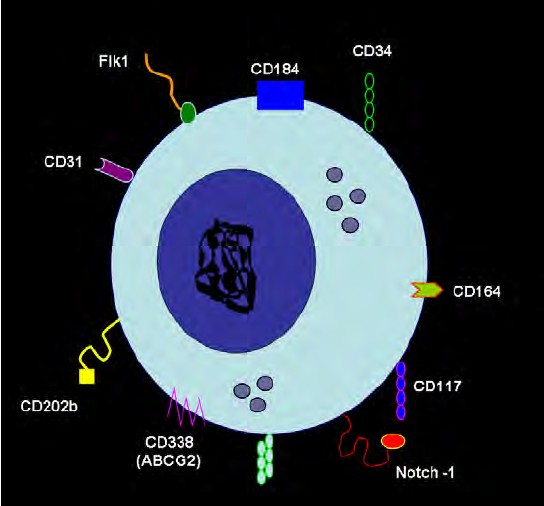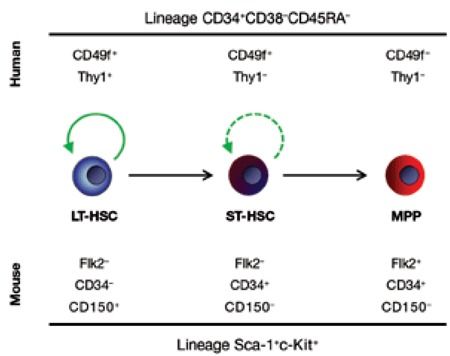CD Antigen (Hematopoietic Stem Cell Markers)
Related Symbol Search List
Immunology Background
Available Resources for CD Antigen (Hematopoietic Stem Cell Markers) Research
Creative BioMart offers an extensive platform dedicated to HSC CD antigens, providing researchers with a comprehensive range of resources, high-quality products, tailored services, and technical support. By harnessing the power of HSC CD antigens research, we aim to advance scientific knowledge, facilitate the development of novel therapies, and contribute to improving human health. Our platform features a comprehensive list of HSC CD antigens, including well-known markers such as CD34, CD38, CD90, CD117 (c-Kit), CD133, CD45, and many more.
- At Creative BioMart, we provide a diverse range of products to support HSC CD antigens research. Our offerings include antibodies, recombinant proteins, protein pre-coupled magnetic beads, cell and tissue lysates, chromatography reagents, and various kits targeting different HSC CD antigens. These high-quality products enable precise detection, characterization, and analysis of HSCs and their functions.
- Additionally, we offer customized services tailored to meet specific research needs. Our team of experienced scientists provides custom antibody development, protein engineering, recombinant antigen production, and assay development services. Leverage our expertise to generate custom tools specifically designed for your HSC CD antigens research project.
- Furthermore, Creative BioMart provides a wealth of resources covering multiple aspects of HSC CD antigens. Our platform includes information on pathways, protein functions, interacting proteins, related articles, research areas, and other relevant topics. These resources aid researchers in exploring diverse research areas and understanding the associations between HSC CD antigens and various diseases. Stay updated with the latest discoveries and advancements in the field through our comprehensive resources.
Our Featured Products
| Cat.# | Product name | Species | Source (Host) | Tag |
|---|---|---|---|---|
| CD33-176HF | Active Recombinant Human CD33 Protein, Fc-tagged, FITC conjugated | Human | Mammalian cells | Fc |
| CD34-3685H | Recombinant Human CD34 protein, GST-tagged | Human | E.coli | GST |
| CD38-653H | Active Recombinant Human CD38 protein, His-tagged | Human | HEK293 | His |
| CD48-654H | Recombinant Human CD48 protein, His-tagged | Human | HEK293 | His |
| CD93-10985H | Recombinant Human CD93, His-tagged | Human | E.coli | His |
| Eng-3289M | Active Recombinant Mouse Eng protein, His-tagged | Mouse | HEK293 | His |
| KDR-1080RF | Recombinant Rat KDR Protein, His-tagged, FITC conjugated | Rat | HEK293 | His |
| KIT-3947H | Recombinant Human KIT protein, His-tagged | Human | HEK293 | His |
| THY1-3228H | Recombinant Human THY1, His-tagged | Human | E.coli | His |
About CD Antigen (Hematopoietic Stem Cell Markers)
Hematopoietic Stem Cells (HSCs) are a rare population of cells that possess the ability to self-renew and differentiate into various blood cell types. They are responsible for the continuous production of red blood cells, white blood cells, and platelets throughout an individual's lifetime. Understanding the properties of HSCs and their regulation is essential for advancing therapies for blood disorders, immune system disorders, and certain types of cancers.
CD Antigens have emerged as key tools in the study of HSCs. They enable researchers to identify, isolate, and characterize specific subsets of HSCs within complex cell populations. By using CD Antigens as markers, scientists can track the development of HSCs, investigate their functional properties, and gain insights into the mechanisms of cell differentiation and immune responses.
Prominent CD Antigens associated with HSCs include CD34, CD38, CD90, CD117 (c-Kit), CD133, and CD45. These markers, often used in combination, provide a comprehensive profile of HSCs and their various subpopulations. Researchers employ techniques such as flow cytometry and magnetic cell sorting to isolate and purify HSCs based on their expression of specific CD Antigens.
The importance of CD Antigens in HSC research extends beyond identification and isolation. They also play a significant role in studying the expansion and differentiation of HSCs, both in vitro and in vivo. By manipulating the expression and interaction of CD Antigens, researchers can explore methods for HSC expansion, enhance their differentiation into specific blood cell lineages, and advance the field of regenerative medicine. By leveraging the power of CD Antigen research, scientists can develop innovative therapies for various blood disorders, immunodeficiencies, and potentially other diseases in the future.
 Fig.1 HSCs main surface markers. HSCs express typical antigens as: CD34, CD117, CD164, CD202b, CD31, Flk-1, CD184, CD338 or ABCG2, Notch-1 concomitantly with the lack of terminal differentiation markers (CD4 and CD8). (Sérgio Paulo Bydlowski, et al, 2012)
Fig.1 HSCs main surface markers. HSCs express typical antigens as: CD34, CD117, CD164, CD202b, CD31, Flk-1, CD184, CD338 or ABCG2, Notch-1 concomitantly with the lack of terminal differentiation markers (CD4 and CD8). (Sérgio Paulo Bydlowski, et al, 2012)
Research Applications of CD Antigen (Hematopoietic Stem Cell Markers)
HSC Identification and Characterization
- CD34 is a well-known marker used for identifying and characterizing HSCs. For example, researchers have utilized CD34 expression to isolate and study HSCs from bone marrow or cord blood samples. By analyzing the expression levels of CD34, they can identify HSC populations and investigate their functional properties.
HSC Isolation and Purification
- CD45, a common leukocyte antigen, is widely used to isolate and purify HSCs. Researchers employ flow cytometry or magnetic cell sorting techniques using CD45 antibodies to enrich HSC populations. This enables the isolation of highly purified HSCs for downstream experiments. For instance, CD45-based sorting has been used to obtain pure HSC populations for gene expression profiling or transplantation studies.
HSC Development and Differentiation
- CD38 is a marker involved in studying HSC development and differentiation. Researchers have used CD38 expression to identify different stages of hematopoietic cell maturation. By tracking the changes in CD38 expression during HSC differentiation, they can investigate lineage commitment and understand the progression of cells toward specific blood cell lineages.
HSC Expansion and Transplantation
- CD117 (c-Kit) is a crucial marker in HSC expansion and transplantation studies. For example, researchers have explored the effects of CD117 signaling on HSC self-renewal and expansion. By manipulating CD117 expression or using CD117 agonists, they aim to enhance HSC expansion ex vivo for therapeutic purposes or improve the engraftment efficiency of transplanted HSCs.
Disease Mechanisms and Therapeutic Targets
- CD133 is a marker associated with cancer stem cells, including leukemic stem cells. Researchers have utilized CD133 expression to identify and characterize leukemic stem cells in various types of leukemia. By understanding the role of CD133-positive leukemic stem cells in disease progression and resistance to therapy, they can develop targeted treatments specifically directed against these cells.
Drug Discovery and Screening
- CD90 (Thy-1) is a marker used in drug discovery and screening targeting HSCs. Researchers have employed CD90 expression to assess the effects of candidate drugs on HSC behavior. For instance, by treating HSCs with a potential drug and monitoring changes in CD90 expression, researchers can evaluate the drug's impact on HSC proliferation, differentiation, or self-renewal capacities.
HSC CD antigens aid in the identification, isolation, and characterization of HSCs, contribute to our understanding of HSC development and differentiation, provide insights into disease mechanisms, and support drug discovery efforts targeting HSCs. The use of CD Antigens as research tools continues to advance our knowledge of HSC biology and has implications for the development of novel therapies for hematological disorders and beyond.
 Fig.2 Cell surface markers used for segregation of human and mouse LT-HSCs from ST-HSCs and multipotent progenitors. (Challen GA, et al, 2011)
Fig.2 Cell surface markers used for segregation of human and mouse LT-HSCs from ST-HSCs and multipotent progenitors. (Challen GA, et al, 2011)
Choose Creative BioMart as your partner in HSC CD antigens research, and benefit from our wide range of resources, high-quality products, and customized services. Together, we can drive scientific progress, uncover new insights, and make a meaningful impact on human health. If you have any questions, requirements, or cooperation intentions, please feel free to contact us. We very much look forward to working with you and helping you achieve research and commercial success.
Related References
- Rix B, Maduro AH, Bridge KS, Grey W. Markers for human haematopoietic stem cells: The disconnect between an identification marker and its function. Front Physiol. 2022;13:1009160.
- Sérgio Paulo Bydlowski, Felipe de Lara Janz. 'Hematopoietic Stem Cell in Acute Myeloid Leukemia Development', Advances in Hematopoietic Stem Cell Research. InTech, Jan. 27, 2012.
- Challen GA, Goodell MA. Bridge over troubled stem cells. Mol Ther. 2011;19(10):1756-1758.

